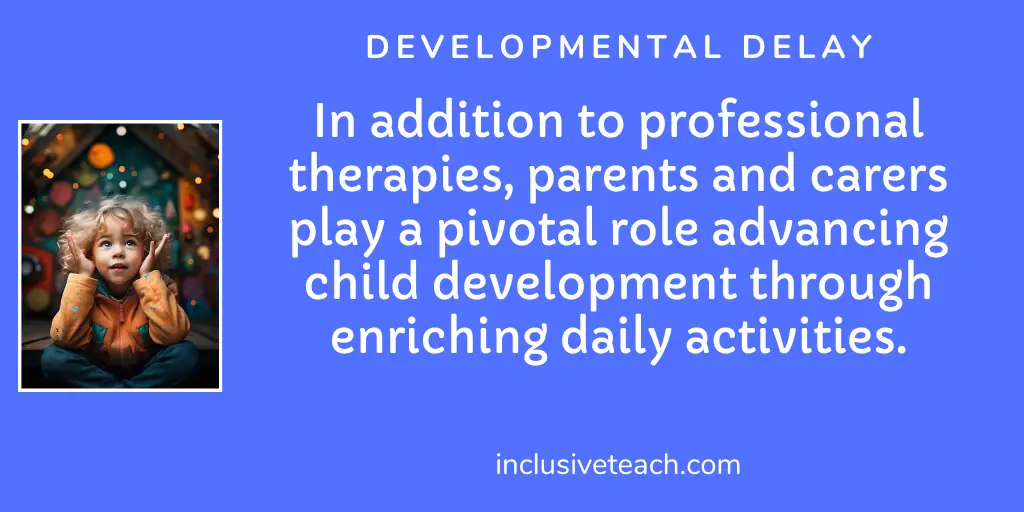Teaching Strategies for Developmental Delay
Developmental Delay: Early Detection and Intervention
Child development proceeds rapidly in the first few years of life as critical cognitive, language and motor skills emerge. As such, the early years represent a crucial period for the detection and mitigation of potential developmental delay. Extensive research has shown that the earlier interventions can begin for children experiencing delays, the better the outcomes tend to be as they grow.
What Is Developmental Delay?
A developmental delay occurs when a child does not reach expected developmental milestones at typical times. These milestones encompass various areas of growth, including cognitive, social, emotional, speech and language, and motor skills
A major study analysed treatment outcomes for children with various developmental disabilities who received early intervention services prior to age 3. Compared to similar children who did not receive early support, the preschoolers who participated in targeted therapies demonstrated significantly improved cognitive performance, higher adaptive skills like self-care, and stronger social-emotional abilities. They also required fewer special education interventions by school age.
More recent studies have continued finding evidence for substantial lifelong benefits of early interventions. An analysis looking specifically at language delays indicated children receiving speech therapy before age 3 went on to have stronger language and literacy skills into the elementary grades versus peers without early supports. Early detection and treatment of autism spectrum disorder, in particular, has been linked to increased adaptive behaviours, and reduced symptom severity over time.
The first years of a child’s development set the stage for future learning, relationships, and mental health. This underscores the necessity of monitoring milestones closely and addressing any issues promptly through the guidance of pediatric professionals. Let’s take a closer look at typical developmental stages and things parents can look out for before finding the right early intervention strategies.
Developmental Monitoring Checklists
Child development encompasses progress in many areas from ages 0-5 years. Here are guidelines highlighting some important speech, motor, cognitive and social-emotional milestones parents can refer to:
Speech & Language
- 12-15 months: Says “mama” and “dada”, understands simple requests
- 16-18 months: Says 2-3 words, follows 1-step requests, points to body parts
- 24 months: Uses simple sentences of 3-4 words, identifies common objects/pictures
Fine Motor Skills
- 12 months: Points to objects or pictures, scribbles on paper
- 18 months: Turns book pages, stacks 3 blocks or cups
- 24 months: Draws a vertical line, plays with small toys and puzzles
Gross Motor Skills
- 12 months: Stands alone, takes steps holding on
- 18 months: Walks well without holding on, kicks ball forward
- 24 months: Runs, kicks ball, walks up stairs holding rail
Problem-Solving & Social Skills
- 12 months: Bangs 2 objects together, shares attention between person and toy
- 18 months: Finds hidden objects, points to body parts, helps with dressing
- 24 months: Plays pretend, takes turns, points to pictures in books
Teaching Strategies for Developmental Delay
For pupils with developmental delay including Global Developmental Delay (GDD) you need to implement specific teaching activities and approaches. Here are 5 effective teaching strategies for developmental delay:
- Multisensory instruction – Incorporate multiple senses like touch, movement, sight, sound to improve learning and accommodate different learning styles. For example, singing songs with gestures, using manipulatives, and pairing visual aids with verbal instruction.
- Discrete trial training – Break skills into small, manageable steps and provide repeated practice with prompting and positive reinforcement. This method is especially helpful for learning motor, language, academic, and self-help skills.
- Picture exchange communication – Use pictures/symbols to help nonverbal students communicate. Having students hand you picture cards builds understanding of using symbols to express wants and needs.
- Positive behaviour supports – Reinforce positive behaviours instead of punishing negative behaviours. Visual rewards charts, token systems, and immediate praise build motivation.
- Peer-mediated instruction – Modelling and practising skills with same-age peers capitalise on the motivation to emulate classmates. Trained peers provide support through modelling, prompting, and social reinforcement.
The key is providing multimodal, scaffolded instruction focused on actively building individual skills through repetition, reinforcement, prompting, and breaks. Frequent assessment and data tracking ensures teaching strategies adapt to continually improve student learning and developmental outcomes.
When Should I Consult with the Paediatrician About Developmental Delay?
It’s normal for children to hit milestones at varying paces. However, if multiple milestones seem significantly delayed, parents should consult their GP or paediatrician right away, especially if:
- No babbling or response to name by 8-10 months
- No single words by 16 months
- No two-word phrases by 24 months
- No walking without support by 18 months
- Loss of language or social skills at any age
Issues in any domain require professional evaluation to rule out potential problems and ensure optimal school readiness. A pediatrician can conduct developmental screenings and refer for further diagnostic assessments by specialists when needed. Abnormal screens or parental concern should not be ignored, as early intervention leads to improved well-being.
Therapy Options for Developmental Delays
If a developmental delay is diagnosed, targeted therapies are key to helping each child reach their full potential. Individual treatment plans are assembled based on assessments by developmental specialists. The most common therapies include:
- Occupational Therapy (OT) – OT focuses on motor skills used for everyday tasks like self-care, handwriting and playing. Therapists provide hands-on activities to improve dexterity, coordination and sensory processing.
- Physical Therapy (PT) – PT specialises in mobility issues including dyspraxia. Therapists provide exercises strengthening core, leg and arm muscles to aid things like walking, running, throwing and catching.
- Speech Therapy – Speech therapists use tailored activities and speaking/listening games to improve articulation, vocabulary, grammar, social communication and literacy comprehension relevant for school success.
If you are in the USA Early intervention services provide these therapies at minimal to no costs for families through to age 3. Insurance may cover ongoing treatment after age 3 as well, depending on coverage specifics. If you are in the UK many services including portage are available on the NHS. Committing to consistent scheduled therapy has been shown in numerous studies to yield the greatest improvements.
5 Teaching Activities Suitable for Children with Developmental Delay
Here are 5 sample teaching activity lesson plans suitable for students with developmental delays. In terms of early intervention strategies for developmental delays you would always design motivating and meaningful activities according to the student’s interests:
Objective: Students will sort objects into groups based on colour to build categorisation and sorting skills.
Materials: Red, blue, and yellow coloured blocks, sorting mat with 3 sections labelled with colours.
Procedure:
- Present 3 colored blocks to student. Name each colour.
- Demonstrate putting blocks into sorting mat sections matching colour labels.
- Instruct student to pick up a block, identify colour, and sort into matching sections.
- Provide verbal praise and physical prompts as needed.
- Repeat for all blocks, then shuffle blocks and repeat sorting.
- Puzzles with Knobs
Objective: Improve fine motor skills and hand-eye coordination manipulating large puzzles.
Materials: 3-4 large wooden puzzles with large pieces.
Procedure:
- Demonstrate taking apart and reassembling a 3-4 piece puzzle.
- Give student puzzle and encourage attempting to assemble independently.
- Provide verbal prompts and hand-over-hand guidance as needed.
- Celebrate when student assembles puzzle. Repeat with other puzzles.
- Picture Exchange Communication
Objective: Student will hand teacher a picture card to make requests during snack time.
Materials: Picture cards of preferred snacks, velcro strip on table.
Procedure:
- Model picking up picture card, handing to teacher, and requesting “apple please”.
- Prompt student to choose a picture card and hand to teacher when they want a snack item.
- Recognize request and reinforce communication, “Oh, you want chips! Here are some chips!”.
- Fade prompts over time as student uses picture cards independently.
- Sensory Bin Play
Objective: Improve fine motor skills using a variety of manipulatives in sensory tray.
Materials: Bin or tray with rice, beads, water, measuring cups, spoons, tongs, funnels.
Procedure:
- Demonstrate playing with items in sensory tray using hands, cups, tongs, etc.
- Allow student to engage with sensory bin items while narrating play.
- Encourage grasping, pouring, scooping, and transferring items between containers.
- Provide verbal prompts and physical hand-over-hand assistance as needed.
- Following Picture Schedule
Objective: Student will follow a 3-step picture schedule to build receptive understanding, sequence, and routine.
Materials: Schedule board with velcro, 3 picture sequence cards of daily activities.
Procedure:
- Review 3 picture schedule, verbally labeling each activity.
- Direct student to remove velcro pictures one at a time in sequence.
- Physically transition student to each scheduled activity after picture is removed.
- Provide verbal praise and gestural prompts as needed.
- Repeat schedule process multiple times.
Home Activities For Children With Developmental Delay

In addition to professional therapies, parents and carers play a pivotal role in advancing child development through enriching daily activities. Here are some suggestions adapted for individual need levels:
- Read rhyming books and point to pictures, modelling words
- Provide toy foods and utensils for pretend play practicing self-care skills
- Go to the park and encourage climbing, jumping, catching/throwing balls
- Listen to music and dance together, modelling movements
- Draw and colour with crayons/markers, practice holding writing tools properly
- Play with puzzle, blocks and shape sorters for problem-solving challenges
- Practice patience and turn-taking during interactive games
With commitment to even just 15 minutes of focused play per day incorporating movement, social interaction and skill-building fun, parents can exponentially boost gains achieved through formal therapies. A stimulating home environment sets the developmental foundation. If you want to go further and implement more formal early interventions for developmental delay at home try the following ideas.
Certainly! Early intervention strategies at home can significantly impact a child’s development. Here are some practical approaches along with examples:
- Structured Play and Interaction:
- Why? Play fosters learning, social skills, and emotional well-being.
- How?
- Example 1: Sitting in a Chair: For children with conditions like ADHD, sitting still can be challenging. Practice sitting together for short periods, gradually increasing the duration.
- Example 2: Look at Me: Encourage the child to attend to you (not eye contact) during conversations or play. Say, “Look what I have” Joint attention is much better than forced eye-contact
- Sorting and Categorizing:
- Why? Sorting activities enhance cognitive skills and organization.
- How?
- Example 1: Sorting by Color: Sort coloured blocks or objects into different containers based on their colour.
- Example 2: Sorting Familiar Items: Arrange toys or household items by category (e.g., animals, vehicles).
- Functional Learning:
- Why? Understanding the purpose of everyday objects is essential.
- How?
- Example: Identify the Function: Point to a spoon and say, “This is for eating. What else can we use it for?”
- Emotion Recognition:
- Why? Emotional intelligence supports social interactions.
- How?
- Example: Guess the Emotion: Show pictures of different facial expressions (happy, sad, surprised) and ask your child to identify the emotion.
- Daily Routines and Self-Care:
- Why? Consistent routines provide stability and independence.
- How?
- Example: Morning Routine: Create a visual schedule for brushing teeth, getting dressed, and having breakfast.
Addressing Common Co-Occurring Conditions
Certain issues like autism spectrum disorder frequently co-occur with developmental delays due to overlapping underlying brain differences and genetics. Coordinated early intervention simultaneously targeting all areas of need proves most effective long term.
For example, a toddler exhibiting speech delay plus signs of autism like limited eye contact or interest in peers may receive: weekly speech therapy to increase language skills while also enrolling in an assessment nursery of special preschool autism specific teaching approaches embedded into its structure. Multidisciplinary providers will work together in taking a whole-child approach promoting communication, behavior regulation and independence.
Research finds early intensive treatment of co-occurring developmental and mental health needs yields substantially improved mental wellness and higher assessment outcomes at high school or GCSE, versus lacking services or receiving uncoordinated care separately addressing singular issues.
Support For Developmental Delay Beyond Therapy Classes
Beyond clinical interventions, invaluable assistance comes through connecting with advocacy organisations nearby. These groups provide education on additional provision your children may have a right to, referral for evaluations and assistance navigating insurance claims and public funding options for ongoing speciality care (USA).
Peer support networks arranged by condition-specific charities or nonprofits offer invaluable lifelines where parents of children with developmental delays or various disabilities share their experiences, coping strategies and knowledge of area specialists. Such social support aids alleviate parental stress which positively impacts home learning environments.
Additionally, developmentally-appropriate nurseries, preschools or daycare centres provide inclusive learning opportunities where typically developing children and those with mild to moderate special needs learn side by side with the support of extra teachers specially trained in individual education plans (IEP). Structured preschool readiness eases later school adjustment.
Thriving Through Early Support
Though developmental delays and conditions necessitating ongoing care present lifelong challenges, given the right services and compassionate nurturing from devoted families and educators, many children achieve their highest potential. With all the evidence for the profound impact early care and intervention provide setting the course towards resilience, swift pursuit of professional screenings and supports as soon as even mild concerns arise regarding a child’s learning, behavior or relationships cannot be stressed enough.
Frequently Asked Questions
Q: What causes developmental delays?
A: Developmental delays can be caused by a variety of factors, including genetic conditions like Down syndrome, complications during pregnancy or birth, environmental factors, or a combination of these.
Q: How are developmental delays diagnosed?
A: Developmental delays are typically diagnosed through a combination of parental reporting, clinical observations, and standardized developmental screening tools.
Q: Can a child with developmental delays catch up?
A: That depends on the nature and extent of the delay, as well as the interventions implemented. Some children may catch up to their peers, while others may continue to struggle in certain areas.

References and Sources of Information about Developmental Delay
Choo, Y. Y., Agarwal, P., How, C. H., & Yeleswarapu, S. P. (2019). Developmental delay: Identification and management at primary care level. Singapore Medical Journal, 60(3), 119-123. https://doi.org/10.11622/smedj.2019025
McDonald, L., Rennie, A., Tolmie, J., Galloway, P., & McWilliam, R. (2006). Investigation of global developmental delay. Archives of Disease in Childhood, 91(8), 701-705. https://doi.org/10.1136/adc.2005.078147
Williams, A. N., & Essex, C. (2004). Developmental delay or failure to arrive? Developmental Medicine & Child Neurology, 46(7), 502. https://doi.org/10.1111/j.1469-8749.2004.tb00515.x







One Comment